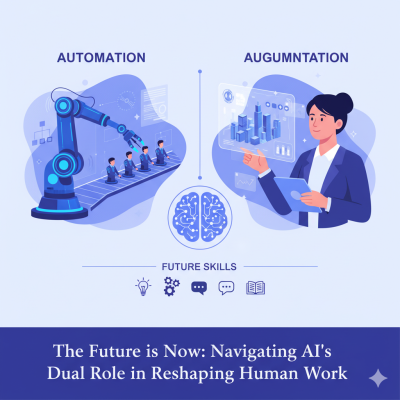-
The Future is Now: Navigating AI’s Dual Role in Reshaping Human Work
AI in the Workforce: Augmentation vs. Automation and the Future of Skills
The narrative around Artificial Intelligence in the workplace often swings between two extremes: the fear of wholesale job replacement and the promise of unprecedented productivity. The reality, however, is far more nuanced, revolving primarily around the concepts of augmentation and automation, and how they are fundamentally reshaping the skills landscape.
Automation refers to AI taking over tasks previously performed by humans. This is where the “job-stealing” anxiety stems from. Routine, repetitive, and data-intensive tasks are prime candidates for automation, from manufacturing assembly lines to basic customer service inquiries handled by chatbots. While some roles may indeed diminish, the history of technology shows that automation often creates new jobs and industries, demanding different types of human expertise.
Augmentation, on the other hand, is where AI acts as a co-pilot, enhancing human capabilities rather than replacing them. Imagine a doctor using AI to analyze medical images for subtle anomalies faster and more accurately, or a marketer leveraging AI to predict consumer trends and personalize campaigns. In these scenarios, AI handles the heavy computational lifting, freeing humans to focus on higher-level thinking, creativity, strategic decision-making, and interpersonal interactions. This synergy leads to better outcomes and more efficient workflows.
The critical insight for the modern workforce is that the future isn’t about competing against AI, but learning to work with AI. This shift necessitates a significant evolution in desired skills:
-
Prompt Engineering & Human-AI Collaboration: The ability to effectively communicate with AI, formulate precise instructions, and interpret its outputs will become paramount.
-
Critical Thinking & Problem Solving: As AI generates information and solutions, humans will need enhanced critical faculties to validate, refine, and apply these insights ethically and effectively.
-
Creativity & Innovation: Tasks requiring imagination, abstract thought, and novel solutions remain firmly in the human domain. AI can be a tool for creative exploration, but the spark of innovation is human.
-
Emotional Intelligence & Interpersonal Skills: Roles demanding empathy, negotiation, leadership, and complex human interaction are increasingly valuable, as these are areas where AI struggles to replicate genuine human connection.
-
Adaptability & Lifelong Learning: The rapid pace of AI development means that continuous learning and the willingness to adapt to new tools and methodologies will be non-negotiable.
Ultimately, AI is not just a tool; it’s a transformation engine. By understanding the distinction between augmentation and automation, and proactively cultivating the skills that complement AI’s strengths, individuals and organizations can thrive in this evolving landscape. The future of work is not just about AI, but about the intelligent collaboration between human and artificial intelligence.
-


